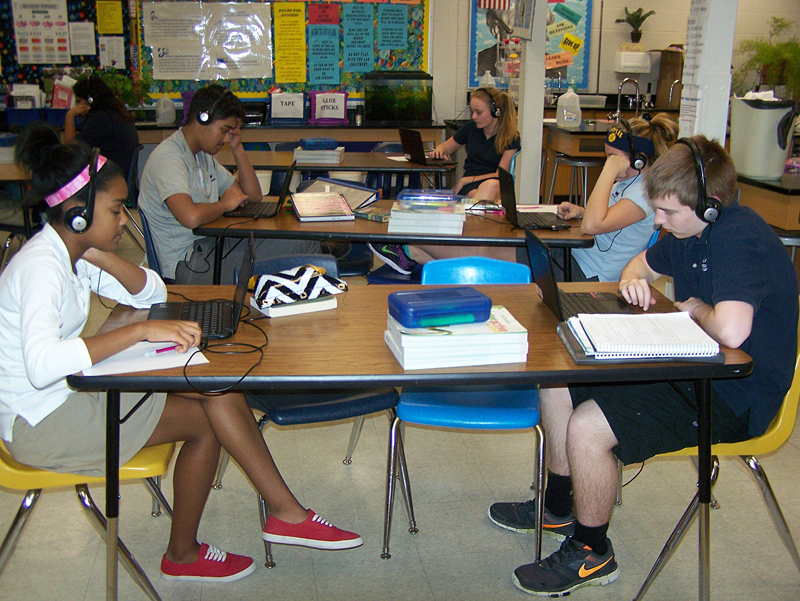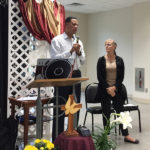By Lindsay Steele
The Catholic Messenger
IOWA CITY — Starting in the fall, all seventh-12th-grade teachers and students at Regina Junior/Senior High School in Iowa City will have simple laptop computers to use in the classroom and for assignments.
“It’s another tool to help our students to learn and our teachers to teach,” said Principal Glenn Plummer.

Regina Junior/Senior High School students in Iowa City use Chromebooks for a class assignment earlier this year. Starting this fall, all seventh-12th grade teachers and students will have a Chromebook to use in the classroom and for assignments.
Implementation of portable computing devices had been on the table at Regina for about five years, but questions had to be answered about cost effectiveness and whether the devices would be more of a burden than a benefit, Plummer said. Finding a solution, at times, felt “impossible.”
In 2014, Regina began to look at Chromebooks, which are laptops that use applications from web-based sources and can be easily controlled and monitored so that students do not use them inappropriately. Plummer felt the devices had potential for the school because of ease of use, technological capabilities and cost (between $250-300 each). The school board of education and finance committees approved use of Chromebooks in two Regina classrooms for the 2015-2016 school year with a plan to expand to all classrooms at a one-device-per-student ratio if the trial went well. The school implemented a $100 yearly tech fee per student, which paid for infrastructure upgrades and the devices. Donations also offset costs.
One of the educators giving the Chromebook a try this year was life science teacher Diane Coffin. Admitting she is not “a technology native,” she thought she might be intimidated by the devices at first. Still, “I jumped in, realizing I needed to learn this technology so I could help the students.”
Coffin received training from a Grant Wood Area Education Agency technology expert. Regina’s IT staffer and the school’s technology librarian also helped her maximize the potential of the Chromebook. Her confidence grew, and now she finds the devices to be an invaluable resource. “They’ve breathed new life into my teaching,” she said. Her students have been able to do more simulations. In one, students used their knowledge of pathogens at the cellular, tissue and organ system level to diagnose illnesses and determine treatments using 21st century medications. Chromebooks also give Coffin the opportunity to teach the students how to determine the reliability of website information.
Tim Scholze, a theology and computer science teacher, also experimented with Chromebooks in his classes. He found it convenient to lead the students in computer-related activities spontaneously since he didn’t have to reserve a computer lab “weeks in advance.”
In his theology classes, the students instantly accessed church documents and the catechism online. Besides the convenience and immediacy of online access to materials, the devices reduced the need for paper copies, Scholze said.
That isn’t to say he completely abandoned “the pencil,” but he understands that his students are living in an increasingly digital world which teachers can help the students to navigate. It is necessary for teachers planning to use Chromebooks to have a back-up plan in place in case of connectivity, network or computer issues, he advised.
Following the positive feedback from the trial run, the school opted to move forward with the plan to implement Chromebook usage in all grades for the 2016-2017 school year. Plummer believes Regina is the first school in the Iowa City area to do this on a one-to-one ratio. Diocesan schools including those in DeWitt and Burlington use Chromebooks to varying extent. Regina teachers have begun training from the Grant Wood Area Education Agency in preparation. Chromebooks will be replaced every three years.
Though the task of offering Chromebook access to every student seemed challenging at first, “It wasn’t impossible,” Plummer said. “It took a little work and research, but it’s a step in the right direction for us to raise the level of education here.”











